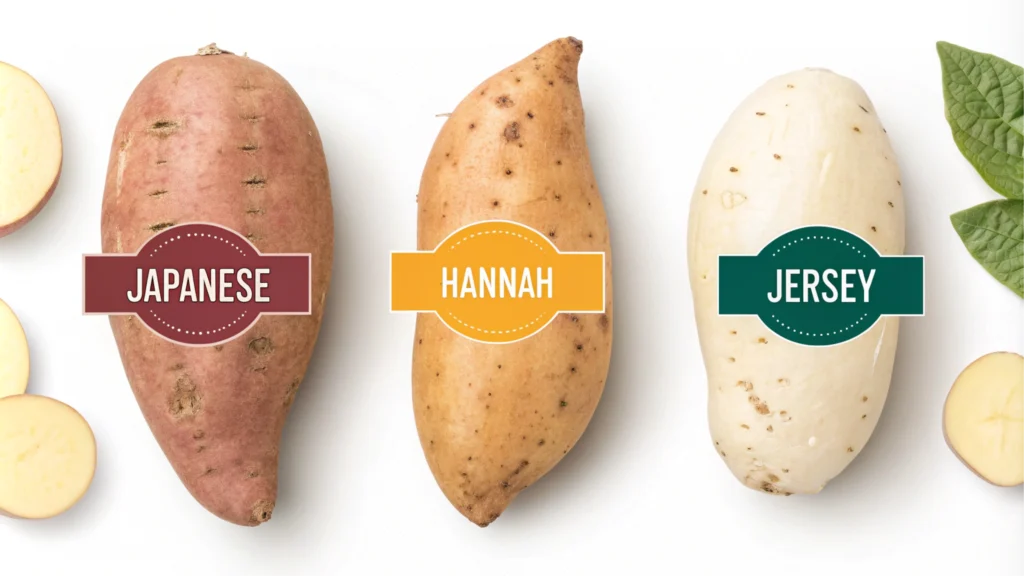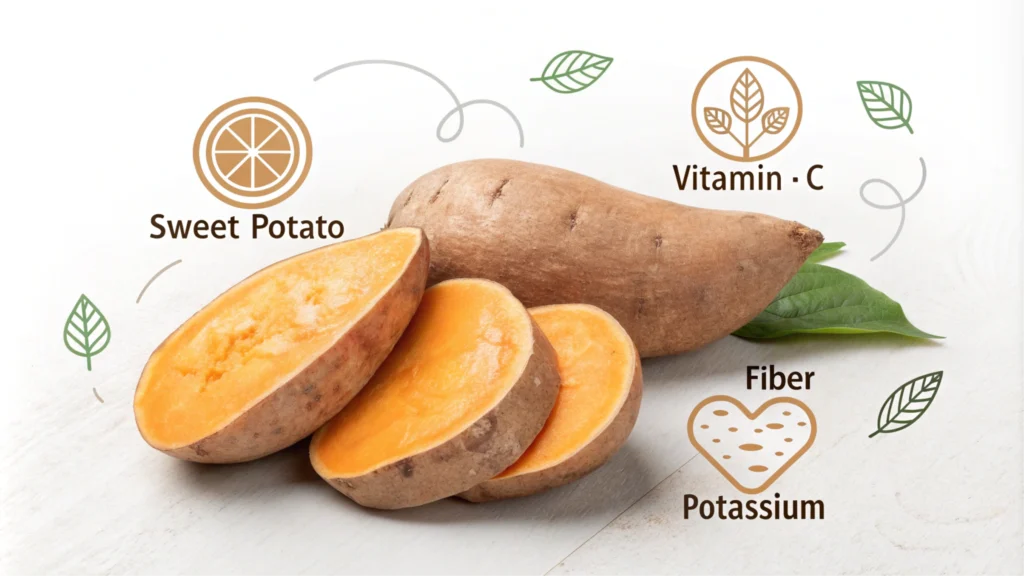Get ready for a tasty journey into the world of White Sweet Potato. This healthy root vegetable is becoming more popular in the U.S. It’s different from the usual orange sweet potatoes, with its own look and benefits.
White sweet potatoes are becoming a favorite in kitchens and restaurants. They have creamy white flesh and a sweet taste. They’re a great choice for anyone looking to try something new in cooking.
Table of Contents
Key Takeaways
- White sweet potatoes are a healthy and versatile root vegetable gaining popularity in the United States.
- They offer a unique appearance and flavor profile compared to traditional orange-fleshed sweet potatoes.
- White sweet potatoes are packed with essential nutrients and offer a range of health benefits.
- Exploring different varieties of white sweet potatoes can enhance your culinary experience.
- Incorporating white sweet potatoes into your meals can provide a delicious and nutritious addition to your diet.
Understanding White Sweet Potato Varieties

White sweet potatoes come in many varieties, each with its own special traits. They offer a wide range of flavors and textures for your cooking. Exploring these varieties can make your kitchen more exciting.
Japanese White Sweet Potato
The Japanese white sweet potato, also known as the Murasaki, is loved for its creamy texture and sweet taste. It has a pale skin and white flesh, making it a beautiful addition to dishes. It’s often used in Japanese cooking, like in baked goods, soups, and stir-fries.
Hannah Sweet Potato
The Hannah sweet potato is known for its bright white flesh and thin skin. It tastes subtly sweet and has a fluffy texture when cooked. Hannah sweet potatoes are great for many dishes, from roasting to mashing, and even as a potato substitute.
Jersey White Sweet Potato
The Jersey white sweet potato is mainly found in the northeastern United States. It has a pale skin and a creamy texture. Jersey white sweet potatoes are loved for their rich, nutty flavor. They’re often used in baking, roasting, and as a base for soups and casseroles.
| Variety | Skin Color | Flesh Color | Flavor Profile | Culinary Uses |
|---|---|---|---|---|
| Japanese White Sweet Potato | Pale, ivory-colored | Creamy white | Delicate, slightly sweet | Baked goods, soups, stir-fries |
| Hannah Sweet Potato | Thin, delicate | Bright white | Subtly sweet, fluffy texture | Roasted, mashed, substitute for regular potatoes |
| Jersey White Sweet Potato | Pale, almost translucent | Creamy, dense | Rich, nutty | Baking, roasting, soups, casseroles |
Nutritional Benefits of White Sweet Potato

White sweet potatoes are a versatile and nutritious root vegetable. They offer many health benefits. These tubers are full of essential vitamins, minerals, and dietary fiber.
White sweet potatoes are high in fiber. A single serving can give you up to 4 grams of dietary fiber. This is great for a healthy digestive system and feeling full.
They also help regulate blood sugar levels. This makes them a good choice for people with diabetes or those who want to manage their blood sugar.
White sweet potatoes are also rich in vitamins and minerals. They have a lot of vitamin C, with nearly 30% of the daily value in one serving. Vitamin C is an antioxidant that boosts the immune system and protects cells.
They also have vitamin B6, potassium, and manganese. These nutrients are important for overall health and well-being.
| Nutrient | Amount per Serving (1 cup, cubed) | % Daily Value |
|---|---|---|
| Calories | 114 | – |
| Carbohydrates | 27g | 9% |
| Dietary Fiber | 4g | 14% |
| Vitamin C | 37mg | 41% |
| Vitamin B6 | 0.4mg | 20% |
| Potassium | 541mg | 12% |
| Manganese | 0.5mg | 22% |
White sweet potatoes are a powerful ally for overall health. They support digestive health, boost the immune system, and are delicious and nutritious. They are a fantastic choice for anyone looking to improve their health.
White Sweet Potato vs. Regular Sweet Potato: Key Differences
Sweet potatoes come in more than just the classic orange variety. White sweet potatoes, also known as Japanese sweet potatoes, have pale flesh and subtle flavors. Knowing the differences between white and regular sweet potatoes can help you choose the right one for your recipes.
Taste and Texture Comparison
White sweet potatoes taste delicate and slightly nutty, unlike the bold sweetness of regular sweet potatoes. Their texture is drier and starchier, similar to a baked potato. This makes them a great choice for certain dishes.
Nutritional Value Differences
Both types of sweet potatoes are packed with nutrients, but they differ slightly. White sweet potatoes have less beta-carotene, which gives orange sweet potatoes their color. But, they have more antioxidants like anthocyanins, which are found in purple sweet potatoes.
Cooking Applications
White sweet potatoes are perfect for various cooking methods. They stay firm when roasted, baked, or grilled, making them great for fries or wedges. They also add thickness to soups, stews, and casseroles.
| Characteristic | White Sweet Potato | Regular Sweet Potato |
|---|---|---|
| Taste | Delicate, nutty | Bold, sweet |
| Texture | Dry, starchy | Soft, moist |
| Beta-carotene | Lower | Higher |
| Anthocyanins | Higher | Lower |
| Cooking Applications | Roasting, baking, grilling | Versatile |
Best Ways to Cook White Sweet Potato

White sweet potatoes are a versatile root vegetable. They can be prepared in many delicious ways. Whether you’re roasting, mashing, grilling, or frying, these charmed recipes can bring out the best in this nutritious ingredient.
Roasting White Sweet Potatoes
Roasting is a simple and effective way to cook white sweet potatoes. Cut them into cubes or wedges, toss with olive oil, salt, and your favorite seasonings. Then, roast at 400°F until tender and caramelized. Roasting enhances the natural sweetness and brings out a creamy, fluffy texture. For more recipe ideas, check out Roasted white sweet potatoes recipe in allrecipes.
Mashing White Sweet Potatoes
For a comforting and smooth side dish, try mashing white sweet potatoes. Boil or steam the potatoes until soft, then mash them with butter, milk, and a pinch of salt and pepper. You can also add spices, herbs, or a touch of maple syrup for extra flavor.
Grilling White Sweet Potatoes
Grilling white sweet potatoes imparts a delightful smoky flavor and charred exterior. Cut the potatoes into thick slices or wedges, brush with oil, and grill over medium-high heat until tender and lightly caramelized. Serve them as a flavorful side or incorporate them into your favorite grilled dishes.
Frying White Sweet Potatoes
For a crispy and indulgent treat, try frying white sweet potatoes. Cut them into thin slices or matchsticks, and fry in hot oil until golden brown and delicious. Toss the fried potatoes with salt, spices, or a drizzle of honey for a tasty snack or side dish.
Whichever cooking method you choose, white sweet potatoes are a versatile and nutritious addition to your culinary repertoire. Experiment with different flavors and techniques to find your favorite way to enjoy this charmed root vegetable.
Storage Tips and Shelf Life for White Sweet Potato
Keeping your white sweet potatoes fresh is key. Follow these easy steps to make them last longer:
Proper Storage Methods
Keep your white sweet potatoes in a cool, dry spot. A pantry or cellar works best. Don’t store them in the fridge, as it can make them hard and taste bad. Instead, keep them at room temperature, away from sunlight and heat.
Signs of Spoilage
Watch for signs that your sweet potatoes are going bad. Look for soft spots, wrinkled skin, or mold. A strong, bad smell means they’re spoiled and should be thrown away.
Freezing Guidelines
You can freeze your white sweet potatoes for longer storage. Peel, dice, and blanch them first. Then, freeze in airtight containers or bags. This keeps their taste and texture good for up to a year. Thaw them in the fridge or at room temperature before cooking.
FAQ
What are the key differences between white sweet potato and regular sweet potato?
White sweet potatoes taste milder and slightly nutty. Regular sweet potatoes are sweeter. They also have different textures when cooked. White sweet potatoes are drier and flakier.
White sweet potatoes have less vitamin A but more vitamin C and fiber. This makes them a good choice for a balanced diet.
How can I incorporate white sweet potatoes into my cooking?
White sweet potatoes are very versatile. You can roast, mash, grill, or fry them. They make great side dishes.
You can also add them to soups, stews, or casseroles. For a sweet treat, try making white sweet potato fries or adding them to baked goods.
What are the health benefits of eating white sweet potatoes?
White sweet potatoes are full of vitamins and minerals. They’re a good source of dietary fiber, which aids digestion and keeps you full. They also have antioxidants, vitamins C and B6, and minerals like potassium and manganese.
These nutrients help keep you healthy and boost your overall well-being.
How should I store white sweet potatoes to maximize their shelf life?
Store white sweet potatoes in a cool, dry, dark place. A pantry or paper bag is best. Don’t refrigerate them, as cold can make them taste bad and become hard.
Stored right, they can last 2-3 weeks. If they shrivel or mold, throw them away.
What are some popular varieties of white sweet potatoes?
Popular white sweet potatoes include the Japanese white, Hannah, and Jersey white. Each variety has its own taste and texture.
The Japanese white is creamy and sweet. The Hannah is dense and dry. The Jersey white is drier and flakier.

